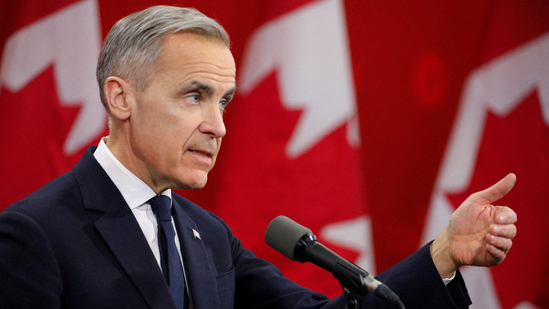Canadian PM Mark Carney Strengthens European Alliances Amid Tensions with Trump
International International NewsPosted by NewAdmin on 2025-03-17 08:46:56 |
Share: Facebook | Twitter | Whatsapp | Linkedin Visits: 42

Newly appointed Canadian Prime Minister Mark Carney has embarked on his inaugural foreign tour, visiting Paris and London to strengthen alliances amid escalating tensions with U.S. President Donald Trump. This strategic move underscores Canada's intent to reinforce historical ties with France and the United Kingdom, especially in light of recent U.S. policies perceived as threats to Canadian sovereignty and economic stability.
In Paris, Carney is scheduled to meet with French President Emmanuel Macron to discuss bolstering bilateral relations and exploring avenues for diversified trade partnerships. The discussions aim to mitigate the impact of U.S. tariffs and assert Canada's autonomy on the global stage. Following this, Carney will travel to London to engage in talks with U.K. Prime Minister Keir Starmer and meet with King Charles III, Canada's head of state. This visit holds personal significance for Carney, a former governor of the Bank of England, marking a return to familiar grounds.
These diplomatic efforts come in response to President Trump's recent imposition of substantial tariffs on Canadian steel and aluminum, coupled with provocative remarks suggesting the annexation of Canada as the 51st U.S. state. Such actions have sparked widespread indignation among Canadians, leading to calls for boycotts of American products and a reevaluation of defense procurements, including the potential cancellation of U.S.-made F-35 fighter jets.
Carney's itinerary also includes a visit to Canada's Arctic regions to reaffirm the nation's sovereignty and address security concerns. This move is particularly pertinent given the geopolitical significance of the Arctic and recent discussions involving the U.S. and Russia that have heightened anxieties about control over this strategic area.
Domestically, Carney is anticipated to call for a federal election upon his return to Ottawa, a decision influenced by the current geopolitical climate and the need to consolidate support for his administration's stance against U.S. policies. The governing Liberal Party, previously facing potential electoral defeat, has experienced a resurgence in support due to nationalistic sentiments provoked by Trump's aggressive posture. Experts highlight the necessity for Canada to diversify its trade partnerships and reduce economic dependence on the United States, which currently accounts for over 75% of Canadian exports. This diversification is deemed crucial not only for economic resilience but also for reinforcing Canada's sovereignty in the face of external pressures.
Search
Categories
Recent News
- Telangana's Cybercrime Conclave: AI Takes Centre Stage
- SEIL's Rs 20 Crore Hospital Project: A Milestone for Rural Healthcare
- India's Strategic Patience: Navigating US Trade Tensions
- Cyclone Ditwah: Andhra on High Alert as Storm Approaches
- Fiscal Focus: Navigating the Path to Economic Stability
- Asian Football Showdown: India Joins the Race to Host 2031 Asian Cup
- Hyderabad Firm's $5.2 Crore Fraud Unveiled
- Space Data Centers: Musk's Vision or Mission Impossible?
Popular News
- Navigating IPO Market Dynamics Amid Volatility and Regulatory Changes
- Massive Worldwide Microsoft Outage Disrupts Multiple Sectors
- Panjapur Bus Stand to Reshape TNSTC Routes
- తెలుగుదేశం పార్టీ - పేదరికాన్ని నిర్మూలించడంలో వాగ్దానం
- Universities Embrace Remote Learning Technologies Amidst Ongoing Pandemic